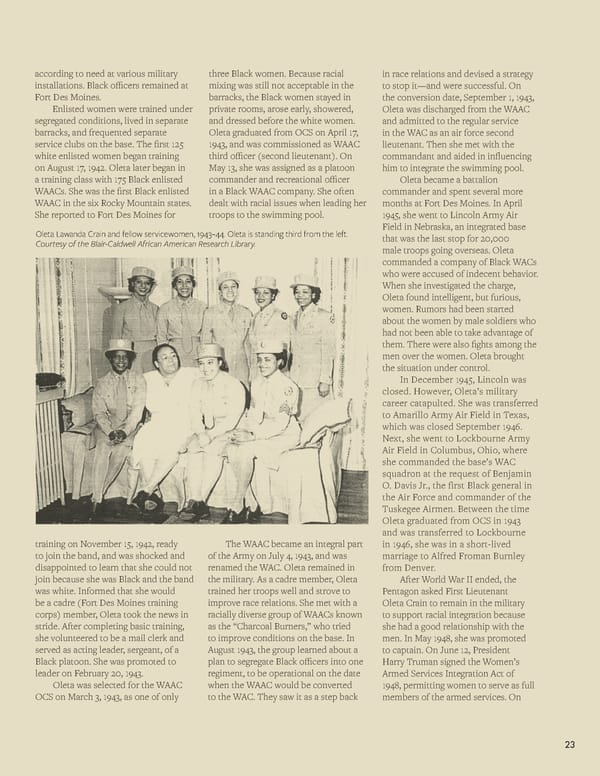according to need at various military three Black women. Because racial in race relations and devised a strategy installations. Black officers remained at mixing was still not acceptable in the to stop it—and were successful. On Fort Des Moines. barracks, the Black women stayed in the conversion date, September 1, 1943, Enlisted women were trained under private rooms, arose early, showered, Oleta was discharged from the WAAC segregated conditions, lived in separate and dressed before the white women. and admitted to the regular service barracks, and frequented separate Oleta graduated from OCS on April 17, in the WAC as an air force second service clubs on the base. The first 125 1943, and was commissioned as WAAC lieutenant. Then she met with the white enlisted women began training third officer (second lieutenant). On commandant and aided in influencing on August 17, 1942. Oleta later began in May 13, she was assigned as a platoon him to integrate the swimming pool. a training class with 175 Black enlisted commander and recreational officer Oleta became a battalion WAACs. She was the first Black enlisted in a Black WAAC company. She often commander and spent several more WAAC in the six Rocky Mountain states. dealt with racial issues when leading her months at Fort Des Moines. In April She reported to Fort Des Moines for troops to the swimming pool. 1945, she went to Lincoln Army Air Oleta Lawanda Crain and fellow servicewomen, 1943–44. Oleta is standing third from the left. Field in Nebraska, an integrated base Courtesy of the Blair-Caldwell African American Research Library. that was the last stop for 20,000 male troops going overseas. Oleta commanded a company of Black WACs who were accused of indecent behavior. When she investigated the charge, Oleta found intelligent, but furious, women. Rumors had been started about the women by male soldiers who had not been able to take advantage of them. There were also fights among the men over the women. Oleta brought the situation under control. In December 1945, Lincoln was closed. However, Oleta’s military career catapulted. She was transferred to Amarillo Army Air Field in Texas, which was closed September 1946. Next, she went to Lockbourne Army Air Field in Columbus, Ohio, where she commanded the base’s WAC squadron at the request of Benjamin O. Davis Jr., the first Black general in the Air Force and commander of the Tuskegee Airmen. Between the time Oleta graduated from OCS in 1943 and was transferred to Lockbourne training on November 15, 1942, ready The WAAC became an integral part in 1946, she was in a short-lived to join the band, and was shocked and of the Army on July 4, 1943, and was marriage to Alfred Froman Burnley disappointed to learn that she could not renamed the WAC. Oleta remained in from Denver. join because she was Black and the band the military. As a cadre member, Oleta After World War II ended, the was white. Informed that she would trained her troops well and strove to Pentagon asked First Lieutenant be a cadre (Fort Des Moines training improve race relations. She met with a Oleta Crain to remain in the military corps) member, Oleta took the news in racially diverse group of WAACs known to support racial integration because stride. After completing basic training, as the “Charcoal Burners,” who tried she had a good relationship with the she volunteered to be a mail clerk and to improve conditions on the base. In men. In May 1948, she was promoted served as acting leader, sergeant, of a August 1943, the group learned about a to captain. On June 12, President Black platoon. She was promoted to plan to segregate Black officers into one Harry Truman signed the Women’s leader on February 20, 1943. regiment, to be operational on the date Armed Services Integration Act of Oleta was selected for the WAAC when the WAAC would be converted 1948, permitting women to serve as full OCS on March 3, 1943, as one of only to the WAC. They saw it as a step back members of the armed services. On 23 35
 December 2022 Oklahoma Hall of Fame Magazine Page 24 Page 26
December 2022 Oklahoma Hall of Fame Magazine Page 24 Page 26